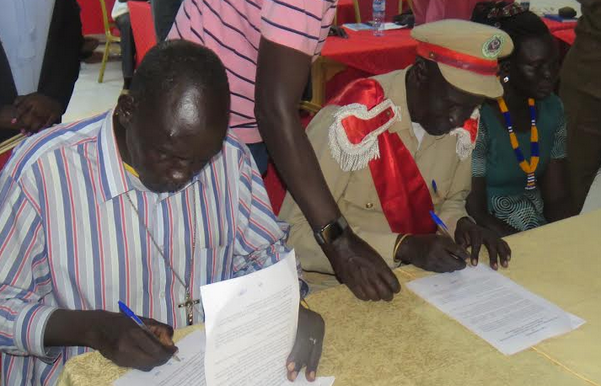Traditional leaders, church groups, civil society organizations, youth and women representatives from the Twic Mayardit community of Warrap State, and Abyei’s Ngok Dinka on Monday agreed to cease hostilities and work to attain peace.
Last Friday, representatives from the two communities commenced a four-day peace dialogue in Wau, Western Bahr el Ghazal State, aimed at ending hostilities and mitigating a conflict that started in February over contested areas.
In their final communiqué, the two communities reaffirmed their full commitment to cease violence and coexist peacefully.
“Having constructively and openly deliberated on the issues that divided the sisterly communities of Ngok Dinka of Abyei and Twic Dinka of Warrap state, we have acknowledged the suffering and pain that we caused to our communities due to continuous violence in the last eight months which has claimed the lives of our beloved ones and led to the loss of properties and massive displacement,” the statement read.
The communiqué read out by a civil society activist Rau Manyiel Rau, had nine resolutions among which was to desist from the use of provocative language which triggers violence.
“We urge the community fighters of both sisterly communities to stop the deadly fighting and we urge all sons and daughters of both communities to abstain from hostile propaganda and hate speech and to promote a culture of peace,” the communique said. “We call upon the elites and politicians to play a more robust role in promoting dialogue and peaceful coexistence among the two sisterly communities.”
Meanwhile, the Abyei representative, Chief Joseph Nyuat Deng, urged all the participants to be ambassadors of peace.
“This is a big responsibility that we are tasked with and it will not defeat us if we are united and follow it,” he said. “The papers that we signed today do not mean the end of everything but because of the love in our hearts for our people, we have to stop violence and give peace a chance.”
On his part, the Twic County representative, Chief Atem Madhieu Deng Atem, said the signing of the intercommunal consultative agreement marks a milestone in achieving peace between the two communities.
“We need to take this message to our people back home so that those we left at home can appreciate us on the fruitful meeting we achieved,” Chief Atem said. “Enough is enough, people can quarrel but in the end, they can come to a level of understanding, let us take this example.”
The peace dialogue which was attended by 42 participants was facilitated by the Community Empowerment for Progress Organization (CEPO) with support from the International Organization for Migration (IOM), Concordis International and UNISFA, UNMISS, and UNDP.




